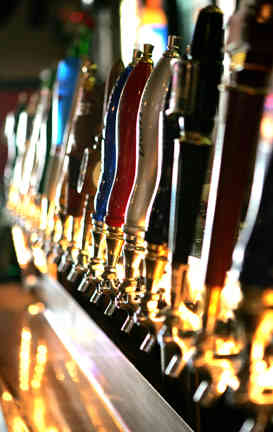 Those that have been watching the growth of the craft beer/microbrewery movement this last decade with a diligent eye know that Big Brewing has done its best to steal back at least a portion of what it’s lost to the little guys—mostly by screwing with the less-than-diligent consumer. The A-B family of brands now includes lines like Green Valley Brewing Company (the name Anheuser-Bush makes no appearance on those bottle labels), Stella Artois and Kirin Ichiban (no, Kirin is not an import if you are American), as well as having their hands stuck in the cookie jars of Red Hook Brewing, Goose Island Brewery and Alexander Keith’s “Nova Scotia Style”.
Those that have been watching the growth of the craft beer/microbrewery movement this last decade with a diligent eye know that Big Brewing has done its best to steal back at least a portion of what it’s lost to the little guys—mostly by screwing with the less-than-diligent consumer. The A-B family of brands now includes lines like Green Valley Brewing Company (the name Anheuser-Bush makes no appearance on those bottle labels), Stella Artois and Kirin Ichiban (no, Kirin is not an import if you are American), as well as having their hands stuck in the cookie jars of Red Hook Brewing, Goose Island Brewery and Alexander Keith’s “Nova Scotia Style”.
With about 3000 breweries in the US now producing tens of thousands of beers, fighting successfully for tap space in bars is about as easy as luring an order of nuns into a gang bang. Of course, there will always be bars that prefer stocking the piss-water that non-demanding customers can chug on the cheap. The places where Shock Top and Blue Moon are viewed as craft offerings. The places where the beer is served ice cold so you can’t tell how shitty it actually tastes. The places where, if forced to patronize, I order a bourbon. And while we’d like to believe that other, more discriminating “craft beer bars” opt for local, seasonal and small-scale brews whenever possible, the reality isn’t always as romantic as the fairytale.
A couple of weeks ago Dann Paquette, co-founder and brewer for Pretty Things Beer & Ale Project in Massachusetts, became a Tweeting whistleblower. Under the brewery’s handle, Paquette pulled the wizard’s curtain back and told Twitterville that Boston is a “pay to play town and we’re often shut out for draft lines along with many beers you may love.” Much like the payola that ruled our radio airwaves in the 50s, Paquette called out the industry for some very illegal “pay to play” hustling—breweries and distributors bribing bars to stock their beers and squeeze out the competition. Paquette railed, “Since I’ve started as a brewer in 1992 it has been a given in Boston that beer lines were for sale.” It certainly isn’t new, and it certainly doesn’t end in Beantown. In 2010, a Crain’s investigation found that a trendy Chicago hotel bar had been taking payouts and other bribes from a powerful MillerCoors distributor. Deb Carey of New Glarus Brewing went so far as to call the city of Chicago “a whores’ market,” noting, “Everyone has a hand out and everyone wants some cash, (free) beer or a discount.”
And sometimes it isn’t cash, but merchandise, that entices a pub. Glassware, grills, coasters, signage, tickets to next week’s big game, etc. that boxes out the small brewery. The pathetic truth, however, is that what was regarded as illegal and reprehensible in the industry back in the 70s is now a fucking business model. The laws may remain in place to “protect free trade” but feds are busy fighting much larger crimes…like keeping absinthe out of US consumers’ hands for nearly a century. And lest you look at Paquette as a whiner who didn’t get his beer on someone’s tap and decided to point tantrum-aimed fingers at innocents that simply didn’t like his beer, others like Greg Koch of Stone Brewing Company have been fighting the same bullshit: “We were supposed to have our event there [undisclosed locale in Chicago] and at the last minute they said, here’s what you need to do. You need to give us X, Y and Z free and discounted in order to come here. Not only were we not able to comply because that’s against our standards (and against IL law, which we respect and follow), we were kicked out of their bar altogether, off all their taps.”
 Put aside the fact that it’s illegal (particularly since I know that none of my readership is beyond fracturing a law or two). Even if microbreweries were willing to throw legality and morality aside to gain access to a handle, they simply can’t afford to out-spend Big Brewing, so they continue to be what punk and heavy metal have always been to mainstream music—a craft seldom appreciated by the lulled, complacent masses who just want some background noise, be it in their ears or on their palate. Do your beer-drinking soul a favor and simply stop giving your business to bars that serve swill. Buy a six pack or two of some local quality suds, take them home, crack one open, put on some Black Flag and raise a middle finger in the general direction of St. Louis, MO.
Put aside the fact that it’s illegal (particularly since I know that none of my readership is beyond fracturing a law or two). Even if microbreweries were willing to throw legality and morality aside to gain access to a handle, they simply can’t afford to out-spend Big Brewing, so they continue to be what punk and heavy metal have always been to mainstream music—a craft seldom appreciated by the lulled, complacent masses who just want some background noise, be it in their ears or on their palate. Do your beer-drinking soul a favor and simply stop giving your business to bars that serve swill. Buy a six pack or two of some local quality suds, take them home, crack one open, put on some Black Flag and raise a middle finger in the general direction of St. Louis, MO.




{ 10 comments… read them below or add one }
Holy crap – it’s a well worn tradition…set your clocks back, change the batteries in your smoke detector, get a new Gonzo Gastronomy post
and come on…if you can’t appreciate fine hand crafted Belgian beer then shame on you…Here is the true story from their own website, and as you very well know, that if you see something on the internet it has to be true:
At Stella Artois, we are extremely proud of our Belgian roots.
Our story can be seen on every bottle of Stella Artois. If you look closely, hints of our origins are proudly displayed.
Let’s start with the year, 1366, the date our brewing roots trace back to. It was then the Den Hoorn brewery was first established in Leuven, Belgium. A world-renowned brewing institution, Den Hoorn laid the foundation for the quality, taste and standard Stella Artois is known for today. To honor it, the symbol of the Den Hoorn Brewery is proudly displayed in the cartouche.
Then in 1708, Sebastian Artois became the master brewer at Den Hoorn. And only nine years later, such was his commitment, he was able to buy the brewery, putting his last name on it and eventually on every bottle of Stella Artois around the world.
Because The Artois Brewery was so beloved internationally and locally, a special batch was brewed as a Christmas gift for our loyal patrons. That special batch was the first to officially include “Stella” in its name. “Stella”, meaning star in Latin, pays homage to this original occasion, accompanied by a star on every bottle.
Suuuure 😉 and let’s ignore the Anheuser-Busch copyright at the bottom of the home page too lol
I am actively searching for a way to slip “cartouche” into my conversation today….If one was to purchase a cartouche from a reputable on line retailer, would they ship it in a cartouche bag?
I hear some feminine products are being sold in those….they ship them in a douche cartouche.
BTW… Hope you and the family are doing well…really miss the great writing…
PS, I drink whatever Sam Adam’s seasonal is being served, with an occasional Yuengling thrown in if I find it on tap…So I may not be qualified to really comment on your story…or be registered to read your blog for that matter
Great to be writing again. Getting the Gonzo groove back. And dude, put down the Yuengling. Oy.
Hello! Unfortunately, in Québec, this is par for the course not only in bars, but in supermarkets and convenience stores. They actually “buy” fridge space so that the craft brews end up hidden in the back somewhere… but some have woken up and are fighting this!
It’s long been par for the course where retail is concerned, without question. Extending the strong arming to pubs, bars, etc. has also been going on for quite some time, but it is being felt more and more by the “little guy” because oftentimes, that’s the one place they can showcase themselves and create interest/demand for their brews.
Hence, the appearance of bars specialised in craft brews. At least, restaurants seem to be more open-minded and conscious of what’s happening. You can’t have great food and lousy beer at the same time!